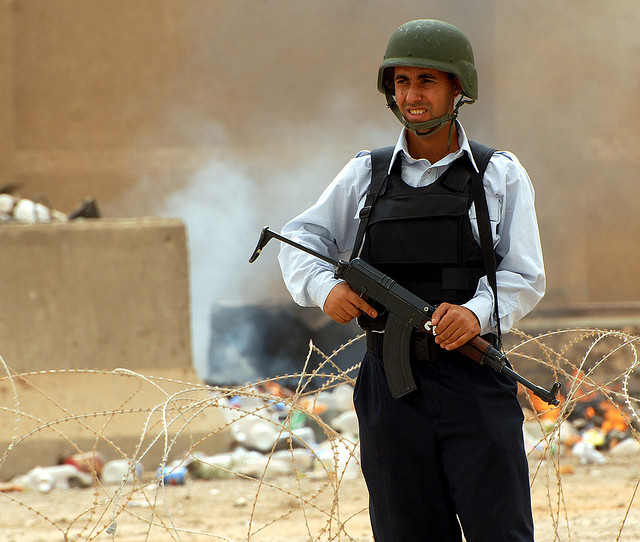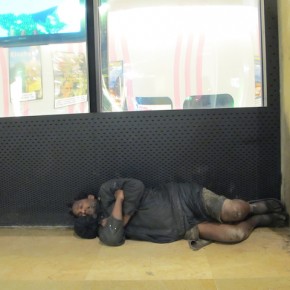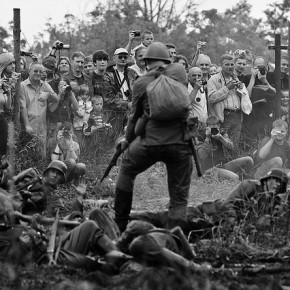The Islamic State of Iraq and Syria (ISIS) and the Naqshbandi Army (an alliance of Ba’athists-cum-Islamists) took Mosul this week, and has advanced on Kirkuk and Tikrit, the latter being Saddam Hussein’s birthplace. Their offensive, which has sent 500,000 people fleeing northern Iraq and been a fiscal windfall for the group after it robbed city banks, was coordinated with other militias, but ISIS is the leading player.
According to correspondents in the Kurdish areas of Iraq, where many Mosul residents have fled to, these men and women (mostly Sunnis, like ISIS’s membership) are fleeing less out of fear of armed groups imposing Sharia Law or turning their homes into fire points, but more for fear that the federal government’s response will be to bomb Mosul to drive ISIS out, and then send troops in to occupy the area. It is the anticipated federal response that is evoking concern.
Their flight explains why ISIS has been so successful in Iraq. The Maliki government is so inept that a “we had to destroy the city in order to save it” mentality has been on display before. It was likely inherited from the American-led occupation of Iraq, where the attitude was most notably seen in the offensive against Fallujah in 2004. Currently, Fallujah is also controlled by anti-government forces, and residents have similarly fled that city ahead of being starved out, or killed in its possibly brutal retaking. For many of these residents, violence is their only contact with Maliki’s regime. ISIS has been expanding into a great vacuum where federal control exists only in name.
Real power lies in the hands of local notables who may or may not be getting what they ask for (money, defense, other resources) from Baghdad. Mosul fell so rapidly because ISIS had shaken down its rulers for money, and had done so intensely enough that the police and army saw no reason to fight to the last man. Remember: there are two divisions of Iraqi soldiers with thousands of soldiers in the area. ISIS won because of ideological reasons, not because they took the field. It also helps that unlike its al-Qaeda predecessors (now its rivals) ISIS is an avowedly “native” organization, despite its many foreign fighters. Its founder is an Iraqi, a quality shared by many of the foot soldiers on patrol in Mosul today.
The prospect of ISIS carving out a state in the region – over what was called “Greater Syria” in centuries past – is all the more surprising because during the occupation, Iraqis rejected al-Qaeda’s similar vision for their country. The worst Sunni insurgents were driven underground as Sunni self-defense groups were recruited to fight militants in a program known as “The Awakening.” How did it come to pass that after their integration into national security, the arrangement has come undone?

Regrettably, the whole undertaking was flawed from the start. Sunnis, armed and trained by the U.S., did not trust the central government. Since the withdrawal of American forces, Maliki was also refusing to recognize their contributions. Baghdad also did not want to go along with a U.S.-backed successor to the program known as “Sons of Iraq” because they feared that the Sons, with possible links to al-Qaeda, would eventually organize and launch a coup. Although the Awakening ended up decimating al-Qaeda in Mesopotamia, it did so on feet of clay. The situation was deeply insecure.
Nonetheless, it almost set the stage for national reconciliation. Sunnis did not boycott the 2010 elections, and the militias proved militarily capable, if not wholly loyal to Baghdad. al-Qaeda had clearly lost its initiative. However, without a revised framework, such healing was impossible. Iraqi national police continued to harass the militias, as well as terrorize Sunni civilians through anti-terror laws. Shi’a dominated leaders, humiliated by continued attacks on holy sites and public venues, decided to invest more heavily in the federal military rather than Sunni-led militias. This worsened relations between the two factions, already deteriorating as a result of a lack of participatory democracy in the area. Along with the bitterly contested 2010 election that Maliki “won,” laid the foundations for a massive protest movement in Anbar province.
These protests were initially nonviolent. They were alternatively condemned and praised in Iraq’s highly sectarian media. Religious heavyweights soon began to put their two cents in as well, especially on the Sunni side. But the players were talking past each other. The divided government would declare that the demonstrators were all terrorists, but then release prisoners as per their demands. As Maliki continued to ignore the movement, protest camps began to fill with members of anti-government militias active in the area. Their demands intensified, such as halting de-Ba’athificiation entirely, and demonstrators began to fight over who “represented” the movement. At the same time, Sunni and Shi’a preachers began exchanging televised sectarian rhetoric. The federal government eventually launched a crackdown after a soldier was murdered in the vicinity of one of the camps, and the protestors were cleared by force.
The eviction of the camps nearly collapsed the ruling coalition in Baghdad. When the government tried to salvage the situation by withdrawing the army from Fallujah, anti-government militias (mainly tribal forces) struck and seized control of the city. Meanwhile, al-Qaeda had managed to rebuild its forces in Syria. These eventually turned back to Iraq. ISIS broke with al-Qaeda after major ideological disagreements, and adopted new Iraqi leadership (the split was only formally declared in early 2014.) Inside Iraq, from 2013 on, it launched an effective wave of attacks against Iraqi officials that created the groundwork for a future assault. The government won some battles with the group, but lost more often than not, and surrendered ground to ISIS and other militias such as the Naqshbandi Army and the General Military Council. ISIS and other groups persuaded the tribal confederations into kicking the national police out of Fallujah and fortifying it against the military’s return. ISIS was from then on the leading voice in Anbar province against a compromise with Baghdad or the provincial authorities.
It is difficult to talk about what will happen in the aftermath of this massive land grab by ISIS. Will it compromise with the federal government, and settle for an autonomous zone? Will these events lead to a coup d’etat? Will Maliki find another way to survive, and still retake these cities? It is difficult to say. No matter what happens, though, Iraq will be paralyzed by instability for years to come. After all, it was only a couple of years ago that these fighters were driven out into the deserts. Now they are seizing Mosul and Tikrit. We will have to see what happens next.
Photographs courtesy of Herald Post and abou ilias. Published under a Creative Commons License.





